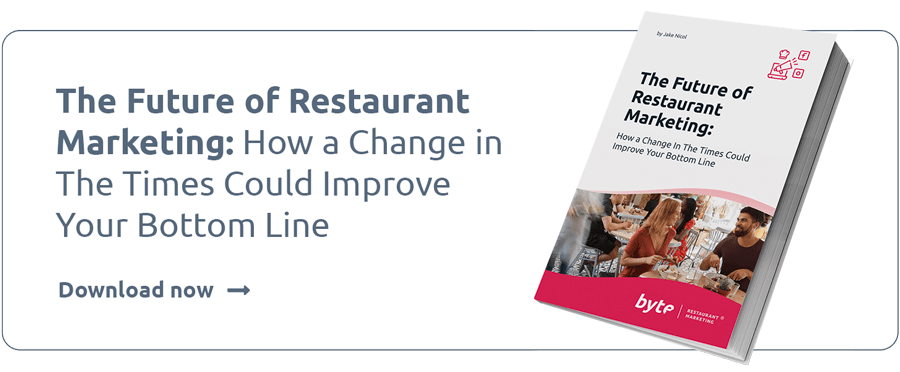Augmented Intuition – How Restaurants Can Benefit From Data Without Losing Their Human Touch
‘Data’ is not a word we often associate with restaurants; while almost every industry is currently racing to incorporate as much ‘data’ into its process as possible, independent restaurants using data seems a strange, slightly absurd concept.
This is probably because hospitality is an almost uniquely social occupation, and therefore attracts people with highly tuned people skills. Restaurateurs, managers and waiting staff tend to work on intuition. And therefore, we assume, ‘data’ is an irrelevance to them.
The reality is, however, that data is simply another way of understanding your business and approaching your problems. And an incredibly powerful one at that.
It can help you make smarter, more intelligent decisions; it can provide invaluable insights into demographics and sales; and It can facilitate personalised digital interactions which help build brand loyalty and increase repeat visits.

Augmented intuition
Consider this scenario: you have two customers in your restaurant. Person A is having a good but not-quite-great time (6 on a scale from 1-7) while Person B is having a relatively poor time (3 out of 7). Most of us have an intuitive understanding Person B should receive the vast majority of our attention, in the hopes that we can salvage their experience and make it better – and that indeed is what generally happens.
This is where ‘the customer is always right’ concept comes from; roughly 80% of customer service effort is spent trying to resolve the experience of very unhappy customers.
However, research from Forrester, a leading research and advisory firm, shows this intuition is in fact wrong.
From the point of view of maximising revenue, you should in fact focus the majority of your energy and resources on improving Person A’s experience so that they have a terrific time.
But, Why?
Because the happiest customers in any industry tend to spend far more than anyone else. Forrester built data models of customer value in across various service industries, and calculated various scenarios using game theory. They found that, in the scenario described above, if you focus your effort on elevating Person A’s experience from 6 to 7 rather than lifting Person B from 3 to 4, you will earn about nine times more revenue.
That is, by solely following your intuition, you are forgoing a ninefold increase in revenue!

This demonstrates the way data can help augment intuition and lead to more financially savvy decision making – and it doesn’t need to have any effect on the human element of your business!
By collecting data of various kinds, you can more accurately assess what offers are working best; improve the efficiency of your rotas and food orders; and properly optimise your menu.
But in order to do that, you need to collect that data properly…

Collecting data
Collecting data is a famously fraught endeavour. With large scale scandals like Cambridge Analytica, and a general growing suspicion of Big Tech businesses like Facebook and Google, how businesses navigate data capture is a major concern today.
The majority of large restaurant chains are already harvesting as much data as they possibly can, and trying to leverage it to drive business. But while these companies may gain some traction through the sheer tenacity of their efforts, the net effect on their brand is generally to alienate consumers who feel they are being squeezed for their data and then treated like nothing more than a number.
Most businesses approach data capture as a technical problem:
Are we GDPR compliant?
Are we capturing data in the most effective ways?
But to create a competitive advantage, you need to instead think about data collection as a marketing challenge.
Smaller restaurants can use many of the same data capture strategies – WIFI access, email lists – that big chains do without being perceived the same way. Consumers are not inherently hostile to the notion of their data being collected: they just want to know it’s being used for the right reasons and feel they’re getting something of value in return. So when thought about this way, data collection actually offers an opportunity for you to create moments and build your brand.
When logging on to free WIFI, most consumers understand that their data is most likely going to be taken. Rather than ignoring this fact, why not address it head on? Why not make a joke of it in your unique brand voice?
Did you know on average, resturant’s accumulate over 500+ email addresses every month per venue with WiFi.
When asking customers’ for their e-mail addresses,
Why not explain to them exactly what they’re going to get from giving them to you?
Why not explicitly tell them how often you will email and them rather than being vague and indirect?
There is no reason to approach any facet of your business in a generic way; everything you do, even capturing data, is an opportunity to demonstrate to consumers that you are more trustworthy, more human, more original and more intelligent than your corporate competitors could ever hope to be.
Data is just another way for you to do this, and as your ability to use it grows, so will your business.
This blog is excerpted from our recent E-book publication, The Future of Restaurant Marketing. Please click here to download the full book for free.